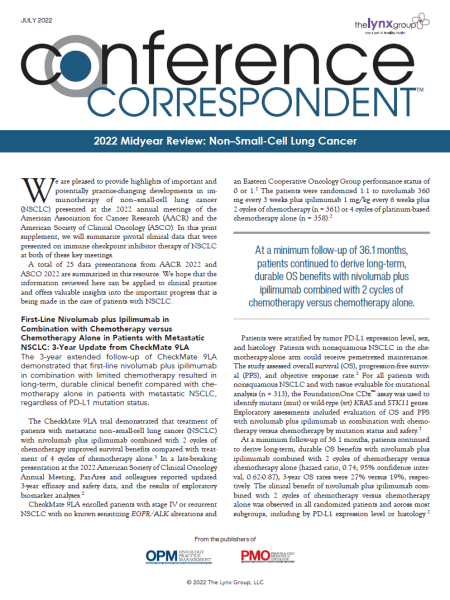Retrospective data from real-world patients demonstrates the effectiveness and safety of nivolumab for pretreated malignant pleural mesothelioma.
Historically, standard treatment for advanced malignant pleural mesothelioma (MPM) included cisplatin plus pemetrexed.1 Nivolumab (Opdivo), an anti–programmed-cell death 1 (PD-1) monoclonal antibody, shows efficacy against pretreated MPM and has been authorized for use in Japan.2 However, data supporting the efficacy and safety of nivolumab in MPM are limited; only 34 patients were studied in the MERIT clinical trial.3 To supplement these data, researchers accumulated real-world efficacy and safety data for nivolumab in patients with advanced MPM.4
A total of 79 patients with MPM treated between August and December 2018, including 63 males and 16 females, were included in this retrospective analysis.4 Most (62) patients had an ECOG performance score of 0-1; 5 had an ECOG performance score of 3.4 Nivolumab was administered as second-, third-, and fourth-line or later treatment for 50, 15, and 14 of these 79 patients, respectively.4
Among 71 patients who were examined for efficacy, the response rate associated with nivolumab was 27%, and the disease control rate was 66%.4 By histology type, response rates and disease control rates were 23% and 65% for the epithelioid type, 56% and 89% for the sarcomatoid type, and 20% and 40% for the biphasic type, respectively.4 Median PFS was 4.1 months, and median OS was 14.3 months.4
The efficacy of nivolumab was analyzed based on the neutrophil-to-lymphocyte ratio (NLR) in the peripheral blood.4 Median PFS and median OS in the NLR ≥3.0 group were 3.7 months and 15.5 months, respectively.4 For patients in the NLR <3.0 group, median PFS and median OS were 5.0 months and 14.3 months, respectively.4 There were no significant differences in response rate, PFS, and OS between the NLR <3.0 group compared with the NLR ≥3.0 group.4
Hypothyroidism (grade 1 or 2) was observed in 11 of 79 patients, fatigue (grade 1 or 2) in 11 of 79 patients, renal dysfunction (grades 1-4) in 6 of 79 patients, loss of appetite (grade 1 or 2) in 3 of 79 patients, rash (grade 1 or 2) in 3 of 79 patients, pneumonia (grade 2 or 3) in 2 of 79 patients, and hypopituitarism (grade 2 or 3) in 2 patients.4
Researchers concluded that this retrospective study of real-world patients demonstrates the effectiveness and safety of nivolumab for pretreated MPM were similar to the findings from the MERIT study. NLR is not effective as a predictive marker of the effect of nivolumab for MPM, but performance score is an independent factor that contributes to PFS and OS in patients with MPM. Nivolumab should be administered to patients whose performance score is favorable.4
References
1. Cinausero M, Rihawi K, Sperandi F, et al. Chemotherapy treatment in malignant pleural mesothelioma: a difficult history. J Thorac Dis. 2018;10(suppl 2):S304-S310.
2. Ono Pharmaceuticals. Opdivo approved for supplemental applications for expanded indications of malignant pleural mesothelioma and adjuvant treatment of melanoma, change in dosage and administration (D&A) of single dosing regimen, and expanded indication of renal cell carcinoma in Opdivo and Yervoy combination therapy. August 21, 2018. www.ono.co.jp/eng/news/pdf/sm_cn180821.pdf. Accessed November 11, 2020.
3. Okada M, Kijima T, Aoe K, et al. Clinical efficacy and safety of nivolumab: results of a multicenter, open-label, single-arm, Japanese phase 2 study in malignant pleural mesothelioma (MERIT). Clin Cancer Res .2019;25:5485-5492.
4. Mikami K, Yokoi T, Takahashi R, et al. Efficacy and safety of nivolumab for malignant mesothelioma in the real world. J Clin Oncol. 2020;38(15_suppl). Abstract 9052.

